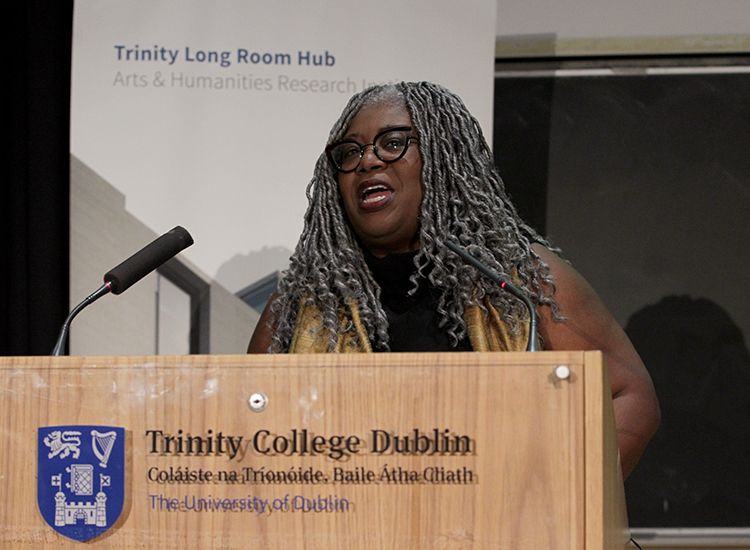The myth of the Irish slave, white supremacy and social media
Posted on: 03 October 2019
Irish Slaves in America: Myths, history, and the problems of social media was discussed by Anthea Butler, Associate Professor of Religious Studies and Africana Studies, University of Pennsylvania, when she delivered the 2019 Annual Humanities Horizons Lecture at Trinity College Dublin on Tuesday, 1 October 2019.

The rise of memes on social media comparing the “Irish slave” with black slavery has its roots in white supremacy, Professor Butler claimed.
A widely known public scholar and media commentator who regularly appears on the BBC, MSNBC, CNN, The History Channel and PBS, said social media accounts and websites posing as history platforms often have the aim of using history to further racism and white supremacy.
“Stories of Irish slavery on Facebook, Twitter and other platforms abound as both history and conspiracy theories that obscure the actual history of Irish indentured servitude and Black chattel slavery in America”
commented Professor Butler, who also teaches the history of slavery.
Irish indentured slavery saw Irish people serving periods of 7 years of labour in the Caribbean and British North America in what is known as indentured slavery. After a period of 7 years, they were freed, unlike African slaves whose children, and their children were born into slavery.
Podcast:
Professor Butler originally came across the dark side to the “Irish slave” myth on Twitter and discovered how it was being used by certain groups online. Her research builds on the work that Liam Hogan, Limerick based librarian and historian, has done in exposing the truth of the Irish indentured slavery.
These readings of history promoted by conspiracy theorists on social media also serve to promote nationalism, to oppose immigration, and even to denigrate religious traditions, Professor Butler commented.
Professor Butler says that
this is a way for white men in America to say, we were enslaved too.
She links the roots of the rise in these memes and the spread of fake history online to a number of events in 2013 and 2014 in the US. In 2014, Michael Brown, an 18-year old African American man was shot dead by a police officer in the city of Ferguson, Missouri. According to Professor Butler, this re-ignited a debate among African Americans about the legacy of slavery and race relations to this day in America and the reparations due to African Americans for slavery.
The use of the “Irish slave” became virulent on the web and was used as a response to these calls for reparations, undermining the African slave trade.
The purpose of these “tropes and memes”, Professor Butler argued, is to draw people in and make people believe this is real history.

Acknowledging Ireland’s turbulent and “terrible” history, she told the audience in Trinity’s Edmund Burke Theatre, “your history is being used for nefarious purposes.”
The Annual Humanities Horizons Lecture was established by the Trinity Long Room Hub Arts and Humanities Institute in 2013 to provide a significant contribution to reflection on and advocacy for the Arts and Humanities.
The Humanities is what gives us our creativity
Professor Butler said, highlighting how universities should be upscaling funding to the humanities in these exceptional times.
However, Professor Butler argued that disciplines in the Humanities from history to religion, need to be more proactive than ever in pushing for public humanities and ensuring that real history and real facts are present on social media platforms.
Video:
When people are drawn into these fake memes and websites, there needs to be counteracting voice from real historians, Professor Butler argued, continuing “the voices from people in the humanities are not there.”
She asked how academics can combat these kinds of lies and untruths on the web, questioning the many social media platforms we have grown accustomed which she said are “disseminating wrong information.”
“For scholars not attuned to these conspiracy theories, these are trying times that put the teaching of history in tension with students, colleagues, religious institutions, and the state.”
Making a plea to humanities scholars which will resonate with scholars of all disciplines, she argued that academics need “to learn how to be public.”
